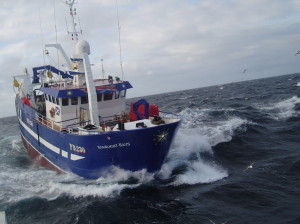 ][1]
][1]Seafood Scotland are sponsoring the Best Fish Restaurant category at the Scottish Restaurant Awards_. The organisation took the 5pm Restaurant blog up to Peterhead to see the Scottish seafood industry in action._
Earlier this week, the 5pm Restaurant blog had a look at Peterhead fish market, Europe’s largest white fish market. Today, we’re going on board the boats that catch Scottish fish and ask what life is like as a fisherman.
James West has fished out of Peterhead all his life and skippered a boat for over twenty years. His father was a fisherman as was his grandfather. You could say that fishing is in his blood but, this being the 21st century, it seems more telling that he keeps a photo of his boat, the 21 metre Golden Sceptre II, on his mobile phone.
Three generations
Golden Sceptre II PD50, to use its full name, is James’ pride and joy. It’s named after the original Golden Sceptre which his father skippered. James had it built by Macduff Shipyards a couple of years ago. Fitted out to James’ specifications, it’s pretty much a state of the art white fish boat and, all being well, it should be in service for the best part of fifty years if not more.
The boat provides a living for James, his brother and also the rotating crew members who take her out to the fishing grounds of the North Sea. According to James, it is becoming harder to find crew in Scotland. Many former fishermen have left the industry to find work in Aberdeen’s booming oil sector. As a result, many boats are taking on crew from abroad. James employs a couple of fishermen from Ghana while many boats have Filipino crew.
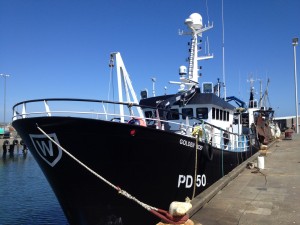 ][5]
][5]Eat healthily
Like the bunks in the sleeping cabins, the galley on board the Golden Sceptre II is compact and tidy. The crew make efforts to eat healthily. Perhaps surprisingly, fish will be on the menu a couple of times a week. The slow cooker is a boon as the crew can fill it up, switch it on and leave it until there is a brief break in the work to be done.
Boats like the Golden Sceptre II are not big, ocean going vessels that sweep the oceans for months at a time. Most of the trips last a week. The boats used to go out for ten days at a time but, according to James, fish stocks are so healthy that they can now catch the same amount of fish in seven days as they used to in ten.
‘Fishing is a mix of art and science,’ says James. ‘On each trip, you have to use your previous experience and be prepared to adapt if your plan isn’t working.’
The wheelhouse of Golden Sceptre II is filled with high tech gadgets to help catch fish. Modern day electronics and computer screens allow skippers to view historical records of previous fishing trips, whilst advanced sonar not only enables the boat to see shoals of fish, but also gives a 3-dimensional view of the seabed. Fishing in the 21st century is certainly a specialised business.
Shoot, trawl and haul
It is also a tough one. James will fish from the Shields area up to the Moray Firth and out to about 150 miles from the coast. Once the boat has reached the fishing ground, the crew will work 24 hours a day in shifts.
‘You’ll never get more than three hours sleep at a time,’ says James. ‘Usually, we will shoot the nets and then haul them in every five hours.’
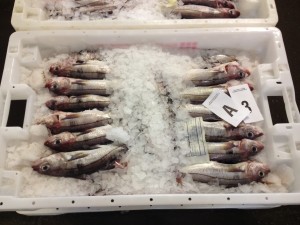 ][6]
][6]The catch from each haul is usually graded, gutted, washed and packed in ice on board. The prep has to be very precise. Fish which is poorly cleaned or raggedly cut fetches a poorer price at market. It is a skilled job. One buyer told me that when he was selecting cod to buy, he wanted fish that had been properly bled. If not, the flesh goes grey when cooked. It’s perfectly edible but consumers don’t like it.
Seasonal produce
The fish James is after will depend on what quota or allowance he has but also on the season. It varies but, in general, at this time of year, he will be looking for flat fish such as megrim or witch. At other times of the year, the boat will be searching for squid or haddock. One of the most sought after and valuable catches is langoustine which the fishermen call prawns.
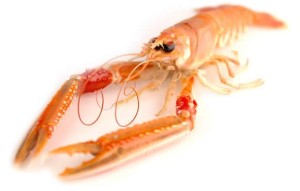 ][7]
][7]Once landed, the catch is auctioned and many factors can affect the price which the Peterhead fishermen get. If a lot of boats come in at once that can lower the price. Demand can also be hit if large volumes of fish are landed elsewhere. If the prices have been ‘Humbersided’, it means that lots of fish have been landed in English ports.
Like many who run their own firm, James has his complaints about his job. Fishing is becoming more tightly regulated and he despairs that he is danger of being ‘more of a businessman than a fisherman’. Asked if he would like his toddler son to follow in his father’s footsteps, there is a lot of hemming and sucking air through the teeth. Balancing this is his determination to just get on with it.
‘It’s what I do,’ he says. ‘It’s what I’ve done since I was a boy and I just want to get out there and catch fish.’
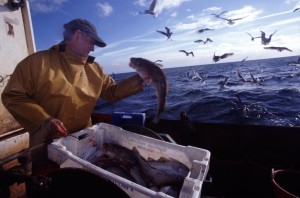 ][8]
][8]